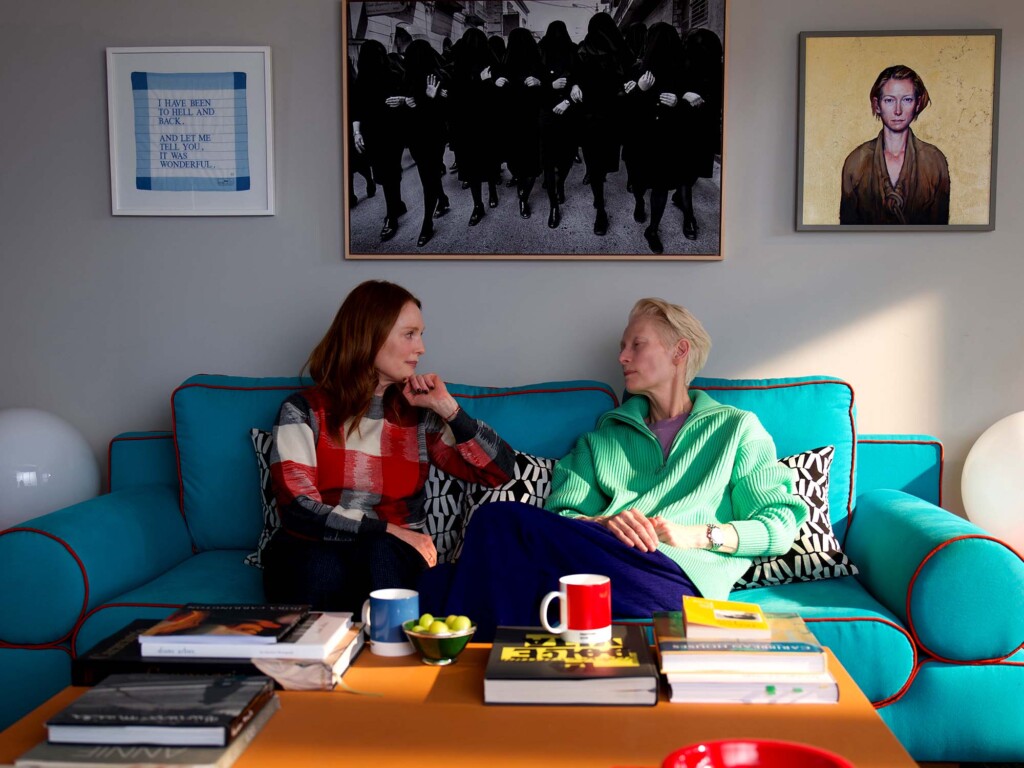Every country has their cinematic icons; the Dutch have Verhoeven, the French have Godard and the Spanish have Almodóvar.
For over 40 years now, Almodóvar has basically carried the entire Spanish industry on his back and played a crucial part in launching the careers of Antonio Banderas and Penélope Cruz.
The Room Next Door is Almodóvar’s English language debut and has drafted in Julianne Moore and Tilda Swinton to tell his first story in a language that isn’t his own.
Based on the 2020 novel What Are You Going Through, the film explores the most hot-button of hot-button issues; euthanasia.
Moore and Swinton share the screen together for about 90% of the film, with Moore playing a famous author who accompanies dying war correspondent Swinton in her final days.
The two are long-term friends, and in the classic Almodóvar style, their relationship and psychology is the driving engine of the film.
Swinton informs Moore that as cancer is ravaging her body she wants to end her life on her own terms.
Moore is told that she is the only person who can be trusted with keeping an eye on her friend in her final days and this creates a fascinating moral dilemma at the centre of the film.
Moore’s character is clearly uncomfortable with being entrusted with such an extraordinary ask by a friend coming towards the end of her life and Moore plays the complexity beautifully.
Moore’s energy is perfectly matched for the quiet chaos of an Almodóvar film, and her dignity is the heartbeat of the film.
The other half of the equation, Swinton, is an absolute delight in the role as the dying journalist; she is every bit as cunning as her Michael Clayton character and inquisitive as her lecturer character in the underseen Three Thousand Years Of Longing.
Swinton also embraces her role with dignity and gravitas, and the film has the sense to have the two stars together as often as possible.
The film explores both sides of an issue and actually has a firm stance on it.
It takes a lot of guts for a film to tackle a major cultural issue, and it is even more refreshing to see it approach it with such grace and nuance.
The Room Next Door is so remarkable because it has incredibly heavy subject matter such as terminal cancer and euthanasia at its core, yet it is still funny and bittersweet like all of Almodóvar’s best films.
Heavy topics aren’t new to Almodóvar – his experiences as a gay man in a liberalising post-Franco Spain are key to his identity as a filmmaker – but there is a deftness to how he treats this material.
It is not hard to imagine this film being shown in schools or university courses as a teaching tool; it is remarkable that a film with such a hard-hitting premise is a crowd-pleaser.
It wouldn’t be an Almodóvar film without him sprinkling in his elements of sweeping melodrama and hilarious character moments, and The Room Next Door delivers on that front.
One striking sequence early on in the film sees a Vietnam War veteran run into a burning house in the countryside, with the scene looking like something from a Terence Malick film.
Another standout scene has Swinton recite the ending monologue from the end of James Joyce’s The Dead, and how it reflects her own current situation.
Any other director would have cut those scenes for being extraneous; in this film, they are key ingredients to the recipe.
Frequent collaborator Alberto Iglesias adds his usual oomph to scenes, helping the film establish its whimsical tone, while cinematographer Eduard Grau finds himself on the same page as his director, giving the film that sense of ethereal wonder.
John Turturro steals the film as a friend of both Moore and Swinton; he is a former lover to both and now he spends his days giving lectures about how the world is doomed because of climate change.
Turturro is always a welcome presence in a film, be it a Coens Brother film or another rewatch of Quiz Show, and his presence here is another splash of colour on the palette.
Turturro monologuing about how the world is doomed because of runaway climate change and rampant capitalism is a classic Almodóvar moment, but the cherry on top is Moore saying in so many words “just because you think the world is ending, it doesn’t mean we should stop living.”
There is an intelligence and sophistication to this film you simply won’t see anywhere else this year.
The Room Next Door has a beautiful colour scheme, which is perhaps the most obvious thing someone says about an Almodóvar film, but in this instance, the colour is practically a character in its own right.
Moore and Swinton are regularly the best parts of whatever films they star in (May-December is still fresh in our minds, as is Swinton’s film-stealing performance in The Killer) and it is always a treat for a film fan to see two great stars working in total sync with a master filmmaker.
The Room Next Door took home the Golden Lion at Venice (an award previously won by award season heavyweights such as Joker, Nomadland and Poor Things) and it is not hard to imagine this film becoming an awards season contender.
There is a refreshing honesty and spark to a film that could have been overwrought and sappy in the hands of another filmmaker, but somehow the stars aligned to give us the irresistible combination of director and actors; make it your business to see this film.
